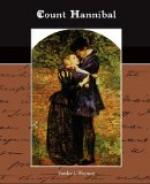He knew this as he walked in the sunlight before the inn, his spurs ringing on the stones as he made each turn, his movements watched by a hundred peering eyes. After all, it was not hard to rule, nor to have one’s way in this world. But then, he went on to remember, not every one had his self-control, or that contempt for the weak and unsuccessful which lightly took the form of mercy. He held Angers safe, curbed by his gibbets. With M. de Montsoreau he might have trouble; but the trouble would be slight, for he knew Montsoreau, and what it was the Lieutenant-Governor valued above profitless bloodshed.
He might have felt less confident had he known what was passing at that moment in a room off the small cloister of the Abbey of St. Aubin, a room known at Angers as the Little Chapter-house. It was a long chamber with a groined roof and stone walls, panelled as high as a tall man might reach with dark chestnut wood. Gloomily lighted by three grated windows, which looked on a small inner green, the last resting-place of the Benedictines, the room itself seemed at first sight no more than the last resting-place of worn-out odds and ends. Piles of thin sheepskin folios, dog’s-eared and dirty, the rejected of the choir, stood against the walls; here and there among them lay a large brass-bound tome on which the chains that had fettered it to desk or lectern still rusted. A broken altar cumbered one corner: a stand bearing a curious—and rotting—map filled another. In the other two corners a medley of faded scutcheons and banners, which had seen their last Toussaint procession, mouldered slowly into dust—into much dust. The air of the room was full of it.
In spite of which the long oak table that filled the middle of the chamber shone with use: so did the great metal standish which it bore. And though the seven men who sat about the table seemed, at a first glance and in that gloomy light, as rusty and faded as the rubbish behind them, it needed but a second look at their lean jaws and hungry eyes to be sure of their vitality.




